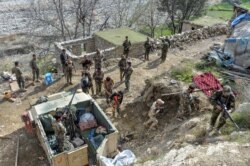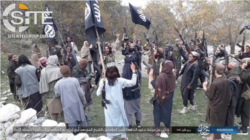The United States' decision to start withdrawing its remaining forces from Afghanistan on Saturday to end Washington's longest-running war has some officials warning of a possible ripple effect that could see the entire region, not just Afghanistan itself, grappling with instability.
The U.S. officials, speaking publicly, point to the security void that will be left by the departing American and coalition forces, admitting it has been hard to get a read on whether countries in the region will accept more responsibility for security and about how they will navigate the seemingly stalled negotiations between the Afghan government and the Taliban.
Just as worrisome, they say, is how regional governments will react if talks fail and Afghanistan finds itself consumed by a new wave of fighting.
Zalmay Khalilzad, U.S. special representative for Afghanistan reconciliation, said one reason for the lack of answers, and the concern, is that these are questions Kabul's neighbors have not had to face — head-on at least — for nearly two decades.
"While we have been there, they have all looked to us to solve their problem," Khalilzad said during a hearing Tuesday on Capitol Hill.
Now, he said, Afghanistan's neighbors will have no choice but to take on more responsibility while bearing the consequences, without being able to use the presence of U.S. forces for cover.
"The region needs to rise to the occasion, because sometimes Afghanistan's war has been a proxy war of different neighbors supporting different elements," he said. "They have their own moment of big decision, of choice."
Stepping up to ensure stability
Khalilzad and other U.S. officials have said there are good reasons for Afghanistan's neighbors to step up to the challenge.
For starters, they believe most countries in the region have determined they have little to gain from an unstable Afghanistan.
Military officials say more fighting could create a new wave of refugees flooding Pakistan, while also putting pressure on Afghanistan's northern neighbors, including Tajikistan, Turkmenistan, Uzbekistan and Kyrgyzstan.
Military and intelligence officials from the U.S. and the region also see a considerable risk that an unstable Afghanistan could give an opening to the numerous terrorist groups operating in the area, including al-Qaida, which retains ties with the Taliban, and Islamic State, which is again showing signs of a resurgence following a series of defeats.
A stable Afghanistan, in contrast, could open up possibilities for more trade and access to raw materials that could boost the regional economy.
Yet U.S. officials say some officials in the region remain skeptical that the economic payoff is worth the price of working to ensure a smooth transition, especially if they can instead just keep problems and the resulting instability contained inside Afghanistan's borders.
"We're working very closely with those that we can," Khalilzad told lawmakers when asked about the regional fallout of the withdrawal. "We obviously, as you point out, we don't have the best of relations with some of them."
That mistrust, though, has not stopped the U.S. from reaching out.
US regional outreach
On Wednesday, Defense Secretary Lloyd Austin spoke by phone with Pakistani General Qamar Javed Bajwa, chief of the army staff, emphasizing the importance of regional stability following the U.S. drawdown in Afghanistan.
Despite an uneasy relationship at times, and concerns about ties between Pakistan's intelligence agency and the Taliban, U.S. officials have praised Islamabad for trying to push the peace process forward.
But military and intelligence officials caution that other regional powers like Iran and China have been hedging their bets, engaging both the Taliban and the Afghan government, hoping to be in a good position no matter how the situation plays out.
There are also concerns about some of Afghanistan's northern neighbors.
Just last week, Secretary of State Antony Blinken discussed the peace process in Afghanistan with his counterparts from Kazakhstan, Kyrgyzstan, Tajikistan, Turkmenistan and Uzbekistan during a virtual meeting of the so-called C5+1.
But some analysts caution none of that can make up for the lack of U.S. boots on the ground.
"It opens up Afghanistan to the natural predation," said Colin Clarke, director of policy and research at the Soufan Group, an intelligence and security consultancy.
"I think the Iranians, the Pakistanis, the Russians, the Chinese in some ways look at Afghanistan as a carcass to be picked over, and they're going to move in," he said. "They're going to sponsor their respective kind of proxies, if you will, or patronage groups on the ground. And things are going to get messy."
Opening for terror groups?
Clarke said in a worst-case scenario in which the Taliban successfully use force to gain nominal control, Afghanistan could look like it did in 2001, when the al-Qaida terror group's leadership used the country to plot its attacks on New York's World Trade Center and the Pentagon.
Former officials also see reason to worry.
"Without U.S. and NATO troops, Afghanistan becomes a more attractive location for terrorist groups to try to operate from. Period," said Scott Worden, former senior policy adviser at the U.S. Agency for International Development.
Already, United Nations counterterrorism officials estimate that as of last year, there were about 8,000 to 10,000 foreign fighters, including 6,500 from Pakistan alone, "in search of a purpose and livelihood in Afghanistan."
U.S. military officials fear those numbers could increase, with foreign fighters flowing into Afghanistan to take advantage of any instability.
There could be a ripple effect, as well.
In particular, counterterrorism officials with U.N. member states have raised concerns about Islamic State-Khorasan, the IS affiliate based in Afghanistan.
While the terror group has seen its numbers dwindle, and it no longer holds territory, there are indications that it has used social media to grow its following across South and Central Asia.
According to a recent Pentagon report, Central Asian countries especially worry a chaotic Afghanistan could give the IS affiliate the chance to expand its reach even further, "creating the potential for destabilization in states bordering Afghanistan."
"There are significant risks," Philippa Brown, a British-based conflict expert and mediator, told VOA's Afghan Service. "I think violent extremist groups will be able to make the most of a worsening security situation in Afghanistan."




